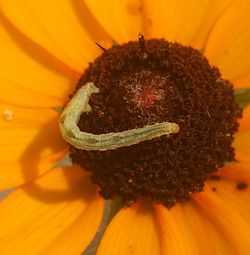Eupithecia miserulata
From Wikipedia, the free encyclopedia
| Eupithecia miserulata | |
|---|---|
 | |
| Scientific classification | |
| Kingdom: | Animalia |
| Phylum: | Arthropoda |
| Class: | Insecta |
| Order: | Lepidoptera |
| Family: | Geometridae |
| Genus: | Eupithecia |
| Species: | E. miserulata |
| Binomial name | |
| Eupithecia miserulata Grote, 1863[1] | |
| Synonyms | |
| |
The Common Eupithecia (Eupithecia miserulata) is a moth of the family Geometridae. The species can be found in North America, from Ontario and Maine in the north to Florida, Mississippi, Louisiana and Texas in the south. It is also found in Arizona and California.[2]

Caterpillar
The wingspan is 12–20 mm. The forewings are greyish to greyish brown. The hindwings are the same colour, but have a small discal spot and a variably represented extradiscal line. The moths flies from March to November depending on the location.
The larvae feed on a wide range of plants, including coneflower, asters, willows, cherry, juniper and clover.
Subspecies
- Eupithecia miserulata miserulata (most of eastern North America)
- Eupithecia miserulata vitans Schaus, 1913
- Eupithecia miserulata zela Swett & Cassino, 1919 (California)
References
| Wikimedia Commons has media related to Eupithecia miserulata. |
| Wikispecies has information related to: Eupithecia miserulata |
External links
This article is issued from Wikipedia. The text is available under the Creative Commons Attribution/Share Alike; additional terms may apply for the media files.